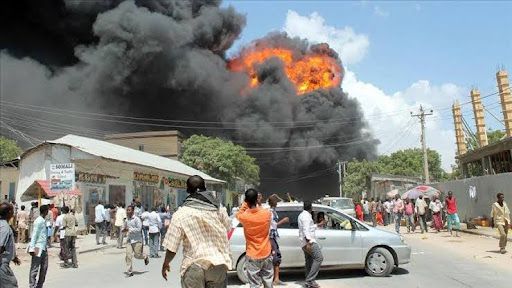4 killed, 18 injured as two IEDs explode in Yobe

```html IED Blasts in Yobe State Claim Lives, Injure Many At least four people are dead and 18 others injured following two separate improvised explosive device (IED) explosions in the Gujba Local Government Area of Yobe State on Friday. The incidents highlight the persistent threat of insurgency and the vulnerability of civilians in the region.
Details of the Explosions The first explosion occurred early Friday morning near Bultaram village, along the Goniri–Buni Yadi road. A commercial pickup van, transporting traders to the weekly Buni Yadi market, detonated an IED when it drove over it. Three passengers died upon arrival at the Yobe State Specialist Hospital in Damaturu. Eighteen other occupants sustained injuries and are currently receiving medical care.
A second explosion occurred hours later in the same general area. An unidentified cyclist triggered another IED and was pronounced dead on arrival at Buni Yadi General Hospital.
Official Response and Investigation While initial reports indicated a higher casualty figure, Dungus Abdulkarim, spokesperson for the Yobe State Police Command, confirmed to TheCable that two people were injured in the second incident. The police are still working to confirm the total number of casualties from both explosions.
Abdulkarim identified Bultaram village as a known hotspot for terrorist activity, suggesting Boko Haram insurgents were likely responsible for planting the IEDs. Security agencies, including Explosive Ordnance Disposal (EOD) units and local vigilantes, have been deployed to conduct clearance operations and prevent further incidents. Investigations are ongoing, with authorities vowing to bring the perpetrators to justice.
Expert Perspective: The Evolving Threat of IEDs Dr. Fatima Aliyu, a security analyst specializing in counter-terrorism strategies in the Lake Chad region, notes that the use of IEDs by insurgents represents a significant challenge to security forces. "IEDs are a weapon of choice for Boko Haram and ISWAP because they are relatively cheap to produce and deploy, and they can inflict significant casualties," Dr. Aliyu explains. "The insurgents often target roads and public spaces frequented by civilians, making it difficult to prevent these attacks entirely. A multi-faceted approach involving enhanced intelligence gathering, community engagement, and improved EOD capabilities is crucial to mitigating the threat."
Historical Context and Current Challenges Yobe State, along with other states in Northeast Nigeria, has been grappling with the Boko Haram insurgency for over a decade. The conflict has resulted in widespread displacement, loss of life, and economic hardship. While the military has made some gains in recent years, insurgents continue to carry out attacks, often targeting vulnerable communities. The use of IEDs is a tactic frequently employed by these groups to instill fear and disrupt daily life.
The ongoing insurgency has created a complex humanitarian crisis, with millions of people in need of assistance. The presence of landmines and unexploded ordnance further complicates the situation, hindering efforts to rebuild communities and restore livelihoods.
Moving Forward Addressing the root causes of the insurgency, including poverty, lack of education, and social marginalization, is essential for long-term stability. Strengthening security measures, promoting community resilience, and providing adequate support to victims of the conflict are also critical steps towards building a more peaceful and secure future for Yobe State and the Northeast region.
Analytical Viewpoint: The Need for Enhanced Security Measures According to Musa Ibrahim, a security consultant based in Maiduguri, the recent IED attacks underscore the need for a comprehensive review of security protocols in vulnerable areas. "While security forces have made progress, these incidents demonstrate that there are still gaps in our defenses," Ibrahim states. "Increased patrols, improved surveillance technology, and enhanced cooperation between security agencies and local communities are essential to prevent future attacks. Furthermore, addressing the underlying grievances that fuel the insurgency is crucial for achieving lasting peace." ```
Originally sourced from: pulse Ng
